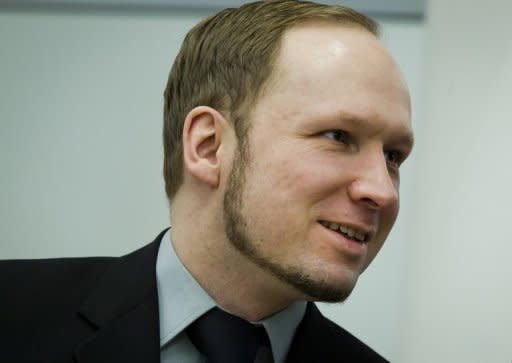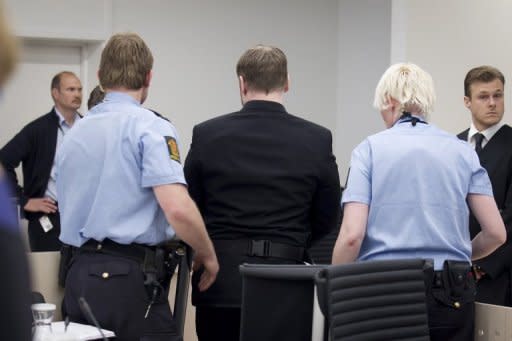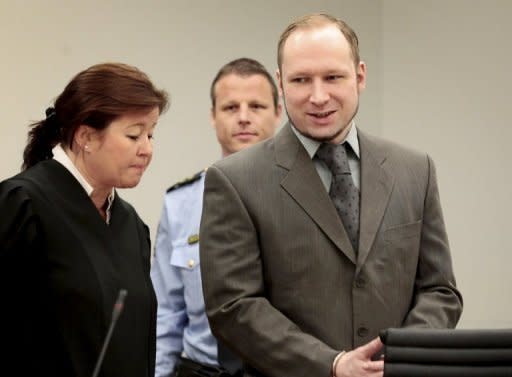Man hurls shoe at Breivik in Norway trial
A brother of one of Anders Behring Breivik's 77 victims threw a shoe at him Friday, screaming "you killer, go to hell!", in the first serious incident since the Norwegian's trial began on April 16. As a coroner wrapped up the autopsy reports on the victims of Breivik's July shooting massacre on Utoeya island, the man suddenly got up and threw a black shoe at the right-wing extremist seated just a short distance away. It missed Breivik but landed on one of his lawyers, Vibeke Hein Baera, who was sitting between the accused and the onlookers. The attack was followed by applause, cries of "bravo" and tears among the many survivors and victims' relatives seated in the courtroom, and led to a brief suspension of proceedings on the 17th day of the trial. "Luckily, it was just a shoe," Hein Baera told AFP after the incident. The attacker, a man of Iraqi origin whose brother was one of the 69 people Breivik shot dead on Utoeya on July 22, was quickly subdued by security guards and escorted out of the courtroom as he continued to shout in English, through tears of anger, "Go to Hell!" "If someone wants to throw something at me, do it at me while I'm entering or leaving, and not at my lawyer," Breivik said when the proceedings resumed a few minutes later. It recalled an incident in December 2008 when then US president George W. Bush was the target of a shoe-throwing Iraqi journalist during a visit to Baghdad . Before suspending the proceedings again for lunch, head judge Wenche Elizabeth Arntzen thanked the participants, including relatives who throughout the trial have often cried quietly or held each other for comfort, for the dignity they had shown. "I would like to thank all of those who have contributed to enabling this particularly difficult procedure to be held in a meaningful and respectful manner," she said. Breivik has been charged with committing terrorist acts on July 22 when he killed bombed a government building in Oslo, killing eight people, before shooting dead another 69 in a rampage on Utoeya, where the ruling Labour Party's youth wing was hosting a summer camp. Most of the victims there were still in their teens, the youngest having just celebrated her 14th birthday. Breivik has confessed to the acts but has refused to plead guilty, insisting they were "cruel but necessary" to stop the Labour Party's "multicultural experiment" and the "Muslim invasion" of Norway and other European countries. While Breivik will surely be found guilty, his 10-week trial will help determine the tricky question of his sanity and whether he will be sent to prison or to a mental institution. Two court-ordered evaluations have reached opposition conclusions, and it will be up to the five-judge panel to rule on the issue when they hand down their verdict in mid-July. Breivik himself is intent upon proving his sanity so that his anti-Islam ideology will not be written off as the ravings of a lunatic. The government on Friday proposed tightening security in mental wards with a measure dubbed "lex Breivik" (the Breivik law) by the media. Current legislation "implies too great a risk for escape, hostage-taking and severe violence against patients and staff in the health institutions where particularly dangerous patients stay," Health Minister Anne-Grete Stroem-Erichsen said. The amendments would make it possible to carry out more searches of patients, to control and limit their communication with the outside world and to search guests. The bill would also make it possible to create a psychiatric unit within a very high-security establishment, like a prison.




